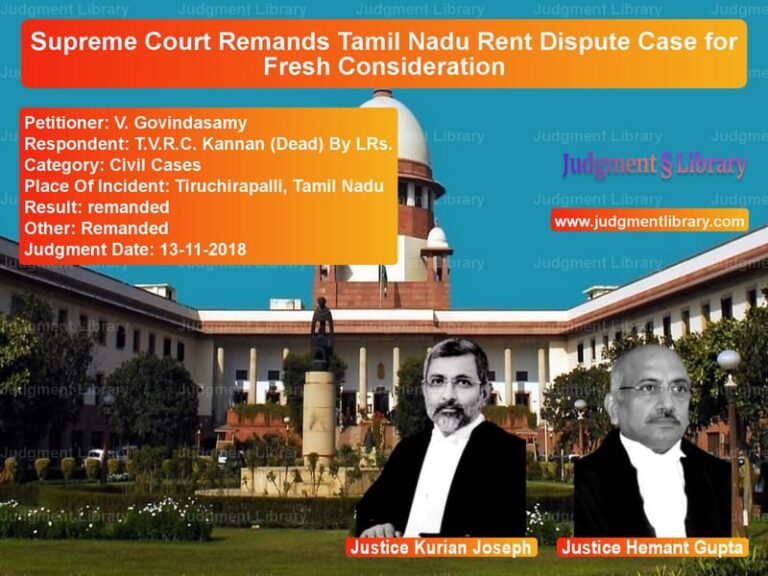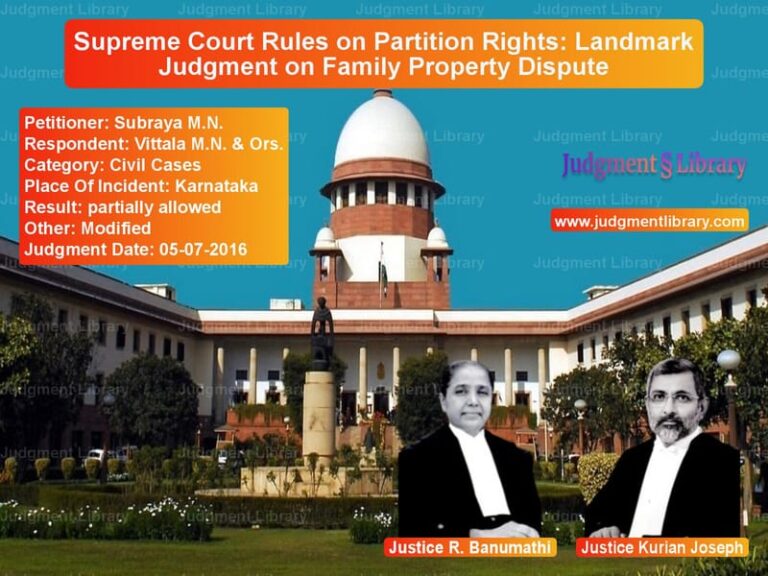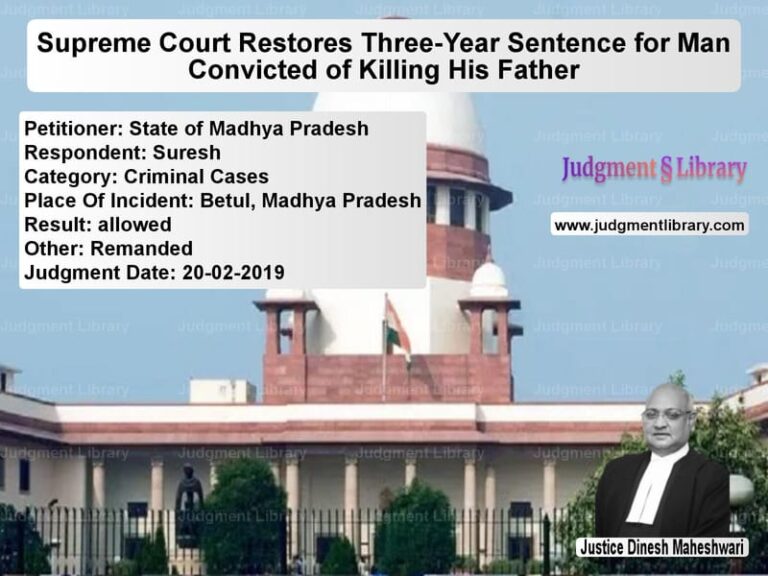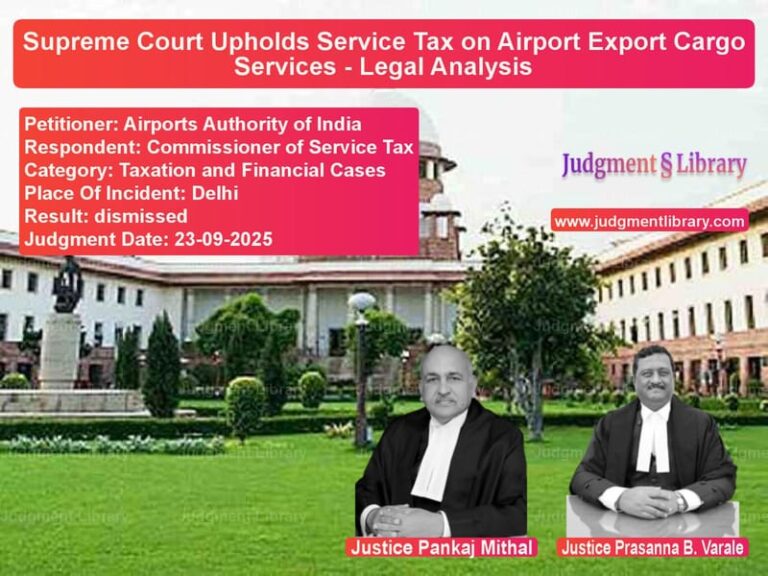Supreme Court Orders Reconsideration of Maharashtra Village Clash Acquittal
The Supreme Court of India, in State of Maharashtra vs. Shankar Ganapati Rahatol & Others, addressed a criminal appeal concerning an acquittal in a violent village clash in Maharashtra. The Court directed the High Court to reconsider the matter, setting aside its earlier order that declined leave to appeal against the acquittal of the accused.
Background of the Case
The case arose from an incident on August 29, 1998, in which a violent altercation occurred in a village in Maharashtra. According to the complaint lodged by Shivram (P.W.1) on September 1, 1998, he was working at Hanuman Water Supply Society when he was attacked by a group of individuals. The complaint led to the registration of FIR No. 1165/1998, charging the accused under various sections of the Indian Penal Code (IPC) and the Bombay Police Act.
The case proceeded to trial before the 5th Additional Sessions Judge, Kolhapur, who acquitted all the accused on September 6, 2005. The State of Maharashtra subsequently sought leave to appeal against the acquittal before the Bombay High Court. However, the High Court dismissed the application on June 13, 2008, prompting the State to approach the Supreme Court.
Key Legal Issues
- Whether the High Court erred in rejecting the State’s application for leave to appeal.
- Whether the acquittal of the accused was justified in light of the medical evidence.
- Whether the existence of a cross-complaint should impact the outcome of the case.
Arguments by the Petitioner (State of Maharashtra)
The State contended:
- The High Court did not properly assess the evidence before rejecting the application for leave to appeal.
- The trial court’s reasoning was flawed, as the medical evidence suggested the complainant had suffered a fracture and other injuries.
- The rejection of the application was contrary to legal precedent, including the Supreme Court’s ruling in State of Maharashtra vs. Sujay Mangesh Poyarekar (2008) 9 SCC 475, which emphasized the need for appellate courts to evaluate the merits of acquittal orders.
- A parallel case (Sessions Case No. 83/1999) arising from the same incident had led to convictions, and an appeal in that matter was still pending before the High Court.
Arguments by the Respondents (Accused)
The accused countered:
- The acquittal was based on a thorough assessment of the evidence.
- The complainant’s injuries did not establish the involvement of the accused beyond a reasonable doubt.
- The existence of a cross-complaint suggested mutual participation in the altercation, which the prosecution had failed to disprove.
- The High Court had rightly exercised its discretion in declining leave to appeal.
Supreme Court’s Observations
The Supreme Court, comprising Justices R. Banumathi and R. Subhash Reddy, examined the case and observed:
“While deciding an application for leave to appeal, the High Court must assess whether a prima facie case has been made out or whether arguable points have been raised. The High Court should not decline leave solely on the ground that the trial court’s decision was not ‘perverse’.”
Regarding the medical evidence, the Court noted:
“The High Court’s observation that there were no injuries on the complainant’s back and thigh contradicts the medical records, which indicate that he suffered a fracture and lacerated wounds.”
The Court further emphasized that since a cross-appeal from the same incident was pending before the High Court, both matters should be considered together to ensure a just outcome.
Final Judgment
The Supreme Court ruled:
“The impugned order dated 13.06.2008 is set aside. The application for leave to appeal filed by the State is allowed, and the criminal appeal shall be taken on record by the High Court for reconsideration.”
The Court also directed that the pending appeal in Sessions Case No. 83/1999 be heard simultaneously with the present case.
Significance of the Judgment
- Reaffirmation of Appellate Scrutiny: The ruling reinforces the principle that applications for leave to appeal should not be dismissed without proper examination of the evidence.
- Importance of Medical Evidence: The judgment underscores that medical findings must be correctly interpreted in criminal trials.
- Handling of Cross-Cases: The decision highlights the necessity of considering cross-complaints in parallel to prevent inconsistent verdicts.
- Judicial Oversight in Acquittals: The ruling ensures that the appellate process serves as a check against erroneous acquittals.
Conclusion
The Supreme Court’s ruling in this case sets a precedent for ensuring that acquittal appeals are not dismissed summarily. By directing a fresh hearing, the judgment upholds the principles of justice and thorough appellate review.
Petitioner Name: State of Maharashtra.Respondent Name: Shankar Ganapati Rahatol & Others.Judgment By: Justice R. Banumathi, Justice R. Subhash Reddy.Place Of Incident: Maharashtra.Judgment Date: 31-01-2019.
Don’t miss out on the full details! Download the complete judgment in PDF format below and gain valuable insights instantly!
Download Judgment: State of Maharashtra vs Shankar Ganapati Rah Supreme Court of India Judgment Dated 31-01-2019.pdf
Direct Downlaod Judgment: Direct downlaod this Judgment
See all petitions in Attempt to Murder Cases
See all petitions in Theft and Robbery Cases
See all petitions in Custodial Deaths and Police Misconduct
See all petitions in Judgment by R. Banumathi
See all petitions in Judgment by R. Subhash Reddy
See all petitions in Remanded
See all petitions in supreme court of India judgments January 2019
See all petitions in 2019 judgments
See all posts in Criminal Cases Category
See all allowed petitions in Criminal Cases Category
See all Dismissed petitions in Criminal Cases Category
See all partially allowed petitions in Criminal Cases Category







